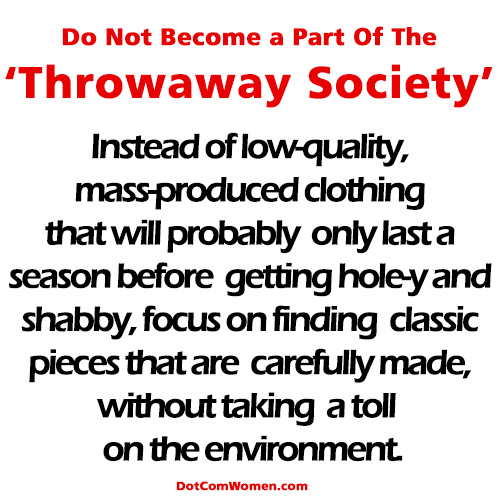Make the Choice of Quality Over Quantity When Shopping
The average U.S. citizen throws away 4.4 pounds of trash per day — this adds up to 254 tons of garbage a year. As someone who is concerned about the environment, as well as the state of your budget, you are probably bothered by these figures. While a percentage of this garbage is stuff like old coffee grounds and chicken bones, you know our tendency to be a “throwaway society” means people are also tossing clothing, electronics and other items because something new and better has come along.

To help reduce your personal contribution to the landfills, you are devoted to choosing high-quality items that will last for years, instead of a larger quantity of cheap stuff that will be in the trash can in a month. With that in mind, check out some products that can help you meet this goal:
Embrace Slow Fashion
With new styles coming out every season, we have sort of been programmed to update our wardrobes on a regular basis. As Not Just a Label notes, one way to stop this constant need to buy new outfits is to join the Slow Fashion movement. Instead of low-quality, mass-produced and inexpensive clothing that will probably only last a season before getting hole-y and shabby, slow fashion focuses on finding classic pieces that are carefully made, without taking a toll on the environment. For example, rather than using synthetic materials which use a lot of energy and resources to make, slow fashion clothing tends to be made from natural and renewable textiles like cotton and wool. And, since slow fashion clothing can be worn for a number of years, people can slow down their consumption, thus letting the Earth catch up by allowing the cotton fields to regenerate. As a bonus, if you are not a fan of shopping for clothing, focusing on quality over quantity means you don’t have to trudge out to the mall as often for new duds.
Smartphones with Long-lasting Hardware
If you want a good example of our throwaway society, the smartphone craze is a good place to start. Many people shell out plenty of bucks for the newest model, only to set it aside a year later for the next big thing. On the flip side, cheaper electronics can quickly become obsolete and break down. In order to avoid both scenarios, try to invest in smartphones that come equipped with the latest and greatest technology that is built to last. For example, Snapdragon from Qualcomm is known as one of the best mobile processors on the market, with plenty of great features that will help your smartphone operating for a long time. The Qualcomm Quick Charge technology will help to recharge your smartphone up to five times faster, and the Qualcomm Haven security suite uses a hardware-based foundation and secure biometric authentication to keep your sensitive data as safe as possible. One of the other features of the fastest mobile processor from Qualcomm is its ability to get to know you, your habits and your voice, adapting along the way and becoming like a virtual helper.

Consider a Pre-owned Electric Car
Some of the latest all-electric cars like the Chevrolet Bolt EV and the Tesla Model 3 can run for over 200 miles on a charge. In addition, electric cars are built to last, so you don’t have to worry about trading it in for a new one after a few years. In fact, electric cars tend to be so well made, you might be able to buy a pre-owned model, saving yourself a great deal of money in the process. Since electric cars tend to have fairly low mileage ranges, used models have typically gone fewer miles and have less wear and tear. Thanks to the proliferation of public charging areas, it is easier than ever to own and drive an electric car.
Despite our overall tendency to throw things away, it is nice to know you do not have to be part of this lifestyle. By focusing on quality items that are more sustainable instead of cheap and inexpensive products, you will save money, be friendlier to the Earth and contribute less to the landfills.



